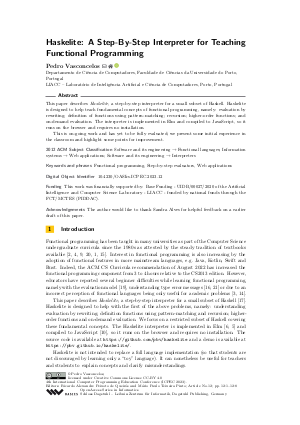@InProceedings{vasconcelos:OASIcs.ICPEC.2023.12,
author = {Vasconcelos, Pedro},
title = {{Haskelite: A Step-By-Step Interpreter for Teaching Functional Programming}},
booktitle = {4th International Computer Programming Education Conference (ICPEC 2023)},
pages = {12:1--12:8},
series = {Open Access Series in Informatics (OASIcs)},
ISBN = {978-3-95977-290-7},
ISSN = {2190-6807},
year = {2023},
volume = {112},
editor = {Peixoto de Queir\'{o}s, Ricardo Alexandre and Teixeira Pinto, M\'{a}rio Paulo},
publisher = {Schloss Dagstuhl -- Leibniz-Zentrum f{\"u}r Informatik},
address = {Dagstuhl, Germany},
URL = {https://drops.dagstuhl.de/entities/document/10.4230/OASIcs.ICPEC.2023.12},
URN = {urn:nbn:de:0030-drops-185080},
doi = {10.4230/OASIcs.ICPEC.2023.12},
annote = {Keywords: Functional programming, Step-by-step evaluators, Web applications}
}

 Creative Commons Attribution 4.0 International license
Creative Commons Attribution 4.0 International license







